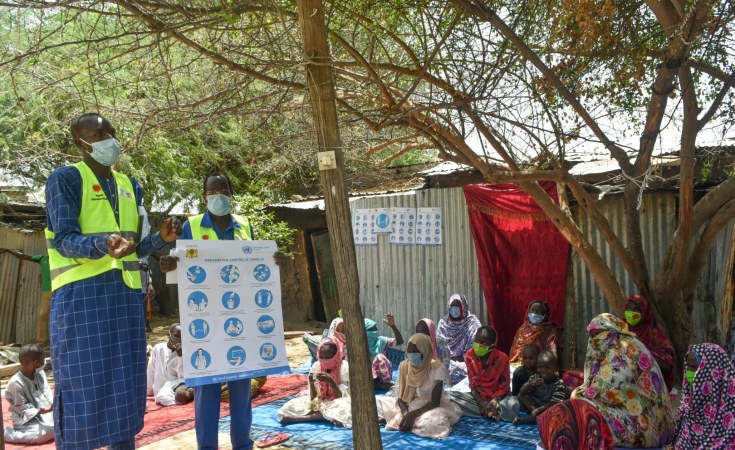Cape Town — As Africa marks six months since the first case of Covid-19 was detected, WHO Regional Director for Africa Dr Matshidiso Moeti went beyond speaking of the more than one million active cases and the 24,278 people who have died of the pandemic.
When the novel coronavirus outbreak pandemic was declared, Moeti said, the main question was: "Aren't you afraid the continent is going to be overrun by the virus?"
"So I believe that some of the measures were taken in this frame of mind of needing to do something drastic to contain, at all costs, and sometimes perhaps at high cost, which is sometimes viewed as being unjustified in terms of strong measures at the time it was necessary for people to understand, internalise and do their own part and deal with the virus," Moeti said during a question session to which allAfrica was invited.
Now, there are fewer cases being reported in South Africa, which has the most cases and deaths on the continent, but some countries are experiencing spikes because of an easing of their lockdown regulations. Burkina Faso, Cameroon, Gabon, Mauritius, Uganda and the Seychelles are also reporting fewer cases than in previous months.
'Sometimes some are more able than others, and it is our collective responsibility to really help them'
"Progression of the virus on the continent is slower than the rest of the world, obviously with the exception of South Africa, and this is the thanks to the concerted actions of African governments, the communities with the support of partners," Moeti said.
Several countries have eased their lockdown regulations in the past few weeks, and the WHO is making a call for this momentum to be sustained to slow the spread of Covid-19, and to continue expanding public health capacities beyond capital cities.
"Economies are being opened up, communities are being required to play their part. Sometimes some are more able than others, and it is our collective responsibility to really help them. Not only with the public health knowledge, but with the socio-economic impact mitigation so that we are not expecting hungry people, people who don't have water in the house, people who can't buy soap or masks ...(to take action)," Moeti said.
WHO sent several officials hotspot countries like to South Africa to support what the government is doing, "but more importantly to get out into the provinces and districts which are the hotspots, so we have people that will be joining Gauteng, going to the Eastern Cape, the Western Cape and KwaZulu-Natal to help with surveillance and analyse data".
WHO had been working with all Africa governments since February, and readiness checks were at 60% then, six months later it improved to 78% at a national level, but now the countries need to concentrate on provinces and districts.
"In Cameroon, for instance, ... the government is continuing to strengthen surveillance to detect any flare-ups, including through deploying mobile surveillance teams. In Ethiopia, there are now 45 laboratories to diagnose Covid-19, and in Nigeria these are 61. Six months ago, there were only 2 laboratories - one in South Africa and the other in Senegal," Moeti said.
Ghana has 57 operational treatment centres, and is expected to add 20 more, while there are 12 isolation units. The Seychelles has leveraged their strong primary healthcare system, and repurposing two hospitals as treatment centres.
'For instance in Zimbabwe, there's been a 90% drop in services'
Moeti said access to medical oxygen is also improving: "The number of oxygen plants in the region rising from 78 to 119, and the availability of oxygen concentrators have been doubled from 3,000 to close to 6,000. Communities have also shown fortitude and care for one another in sometimes extremely challenging circumstances in adhering to public health and social measures, and played their role in slowing the spread of this virus," she said.
The focus on diseases like Ebola - the outbreak in Equator Province so far claimed 36 lives and there are 84 cases - and malaria outbreaks are continuing in several countries, as well as reports of increased cases of teenage girls being pregnant.
However, Moeti did note that there have been reports of "dramatic drops" in contraception services. "For instance in Zimbabwe, there's been a 90% drop in services for the first quarter of the year compared to the same period last year. No doubt the same is happening in other countries, where people are afraid to come to health services because of the risk of Covid-19. And some people just could not move simply (due to lockdowns).
'... top countries in cases for the past week'
"We have as part of a strategic response plan, a pillar around essential health services, to make sure that such key services as contraception, antenatal care and immunisation are restored as they normally would be - in a safe way."
And as the lockdown regulations are eased, countries like Ghana, Kenya and Algeria are seeing an increase in cases, which follows what happened in Europe during the same period.
"Countries like Ethiopia, which for quite a while had very few cases, but now their cases are increasing. Kenya, Algeria, which at some point was starting to see a levelling off and then saw an increase in cases. Madagascar and Zambia. These are some of the countries that have expanded their capacity, and are also the top countries in cases for the past week. This merits looking at, and in one locality in Namibia, for instance, stronger action needs to be taken," Moeti said.


